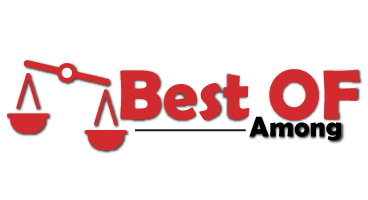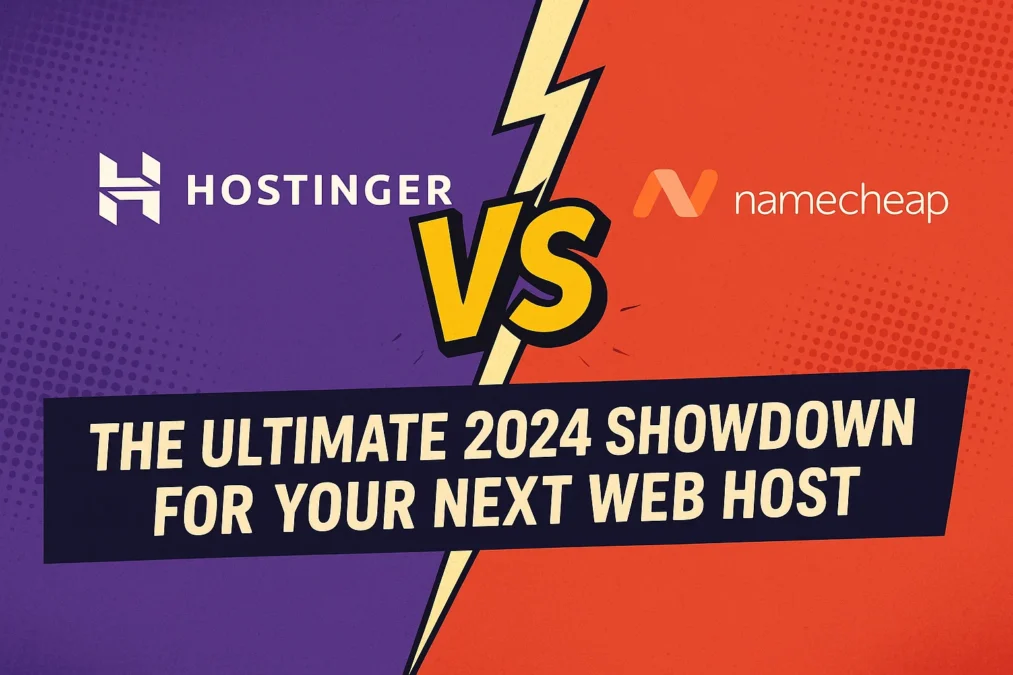So, you’re ready to build a website. You’ve got the idea, the drive, and maybe even a rough draft of your content. But then you hit the first, and arguably one of the most crucial, roadblocks: choosing a web host. The digital landscape is crowded with providers, all promising the moon and the stars. Yet, two names consistently rise to the top of the conversation for anyone seeking a powerful yet affordable starting point: Hostinger and Namecheap.
This isn’t just a casual comparison; it’s a deep dive into the very DNA of these two hosting giants. Both have carved out massive user bases by offering compelling value, but they approach the market from slightly different angles. Hostinger vs Namecheap is a debate that pits a hosting-focused powerhouse against a domain-first titan that has expanded its empire. It’s a battle of raw performance against a well-rounded, feature-rich ecosystem. Whether you’re launching a personal blog, an online portfolio, or a fledgling e-commerce store, the choice you make here will lay the foundation for your online presence for years to come. We’re going to dissect every critical aspect—from the initial price tag and hidden renewal costs to real-world speed, the quality of customer support, and the fine print in their feature sets. By the end of this comprehensive guide, you will have all the information you need to confidently decide which provider, Hostinger vs Namecheap, is the right partner for your digital journey.
Setting the Stage: A Tale of Two Hosting Philosophies
Before we dive into the granular details of server specs and support ticket response times, it’s essential to understand the core identity of each company. Where a company comes from often informs where it’s going and what it prioritizes.
Namecheap, as the name unapologetically suggests, started its life in the year 2000 as a domain registrar. Their entire initial mission was to provide an alternative to the expensive and, at the time, monopolistic domain market. They built a reputation on transparent pricing, fighting for consumer rights, and making domain management simple and cheap. Over the years, they logically expanded into web hosting, leveraging their enormous domain customer base. This means their hosting services are an extension of their core business, designed to be a one-stop shop for someone who buys a domain and immediately wants to build a site.
Hostinger, on the other hand, was born as a hosting company in 2004. From its inception, its focus was squarely on providing affordable web hosting solutions. They have always been a hosting-first company, and this singular focus is reflected in their aggressive development of proprietary technology and a global infrastructure built for speed and reliability. While they also offer domain registration, it feels more like a complementary service to their main hosting products. Understanding this fundamental difference is key. When you look at Hostinger vs Namecheap, you’re often comparing a specialist in hosting with a specialist in domains that also offers excellent hosting.
First Impressions and User Experience: Which Dashboard Wins?
You’ll be spending a lot of time in your hosting account’s control panel, so the user experience isn’t just a minor detail—it’s a critical factor in your daily workflow. Both companies have invested heavily in their interfaces, but they offer distinctly different experiences.
Hostinger has developed its own custom control panel, known as hPanel. This is a bold move, as most budget hosts rely on the industry-standard cPanel. hPanel is modern, clean, and intuitively designed. The layout is minimalist, with clear icons and a logical flow that guides new users from setup to management effortlessly. Tasks like managing databases, creating email accounts, and installing WordPress are streamlined and often require fewer clicks than in traditional panels. For a complete beginner, hPanel is arguably one of the least intimidating and most user-friendly interfaces on the market. It feels like it was designed in the last few years, with a mobile-first mindset and a focus on getting things done quickly.
Namecheap, in contrast, sticks with the familiar cPanel, but they skin it with their own custom theme called the “Namecheap Account.” The main dashboard is where you manage your services, and from there, you dive into cPanel for the nitty-gritty hosting tasks. The advantage here is universality. If you’ve ever used shared hosting before, you already know how to navigate cPanel. There’s a vast amount of documentation and tutorials online for cPanel-specific tasks. For users who are already technically inclined or who appreciate the power and granular control that cPanel offers, Namecheap’s approach will feel comfortable and powerful. The debate between Hostinger vs Namecheap in this arena boils down to a preference for a sleek, custom-built experience versus a trusted, industry-standard workhorse.
The Pricing Puzzle: Unmasking Initial Costs and Long-Term Value
Let’s talk about the number one factor for most people starting out: price. Both Hostinger and Namecheap have built their brands on affordability, but the way they structure their pricing can be a game of smoke and mirrors if you’re not reading the fine print.
Hostinger is famous for its almost unbelievably low introductory prices. Their Single Shared Hosting plan can often be snagged for just a couple of dollars per month, making it one of the most affordable entry points on the entire internet. Their higher-tier plans, like Premium and Business, offer incredible value, bundling in features like unlimited websites, free SSL certificates, and weekly backups for a price that still undercuts most competitors. However, it is absolutely vital to note that these rock-bottom prices are for the initial term only. When the time comes to renew, the price jumps significantly to the standard rate. While this is an industry-wide practice, the gap between Hostinger’s intro and renewal prices can be quite dramatic, so you need to budget for the long haul.
Namecheap also plays the introductory pricing game, and their entry-level Stellar plan is fiercely competitive, often matching or coming very close to Hostinger’s cheapest plan. Where Namecheap often gains a crucial edge in the Hostinger vs Namecheap pricing battle is in their renewal rates. Historically, Namecheap’s renewal price increases are less severe than Hostinger’s. Their long-term value proposition can be stronger, especially if you sign up for a longer term upfront. They also frequently include free domain privacy with their domains, which is a cost that many other registrars, including Hostinger on their lower-tier plans, add as an extra fee. This transparency and focus on ongoing value, not just the first hit, is a core part of Namecheap’s brand identity.
Porkbun vs Namecheap: The Ultimate 2024 Showdown for Your Domain and Hosting
Performance and Speed: Where Every Millisecond Matters
If price gets visitors to your site, speed is what keeps them there. A slow website kills user engagement, decimates search engine rankings, and loses sales. The performance battle in the Hostinger vs Namecheap debate is where their fundamental philosophies become most apparent.
Hostinger has gone all-in on performance optimization. They have developed a deeply integrated stack that they control from top to bottom. Their servers use LiteSpeed Web Server technology, which is a modern, high-performance alternative to the older Apache server software that many hosts, including Namecheap on their standard shared plans, still use. LiteSpeed is built for speed and is perfectly paired with the LiteSpeed Cache (LS Cache) plugin for WordPress. This combination is notoriously effective at delivering blazing-fast load times. Furthermore, Hostinger offers a free CDN (Content Delivery Network) with Cloudflare integration on most plans, ensuring your site’s static files are served from a data center near your visitor. Independent speed tests consistently rank Hostinger among the fastest budget hosting providers globally.
Namecheap offers solid and reliable performance, especially for the price. They have multiple data centers and have been steadily upgrading their infrastructure. However, on their entry-level shared hosting plans, they typically use the standard Apache/Nginx setup. It’s robust and dependable, but it doesn’t quite have the raw speed potential of a LiteSpeed server out of the box. Namecheap does offer higher-tier hosting solutions, such as EasyWP (their managed WordPress hosting) and VPS plans, which can deliver performance that rivals or even exceeds Hostinger’s shared plans. But when comparing their base-level shared hosting directly, Hostinger vs Namecheap often sees Hostinger coming out ahead in raw speed benchmarks due to its aggressive adoption of LiteSpeed technology.
Reliability and Uptime: The Quest for 100% Availability
What good is a fast website if it’s constantly down? Uptime—the percentage of time your website is accessible to visitors—is non-negotiable. Both companies understand this and make strong promises, but their approaches and historical records have nuances.
Hostinger boasts an impressive 99.9% uptime guarantee. To back this up, they have invested in a robust global infrastructure with multiple data centers across the world (in the UK, US, Brazil, Lithuania, Indonesia, and Singapore). They use advanced monitoring systems to proactively detect and resolve issues. In real-world performance tracked by various third-party services, Hostinger consistently meets or exceeds its 99.9% promise, often flirting with 99.95% or higher over monthly periods. This reliability is a direct result of their hosting-first focus; they have built their network from the ground up to be resilient and fast.
Namecheap also provides a 100% uptime Service Level Agreement (SLA) on their shared hosting, which is a even stronger promise on paper. They operate data centers in the US (Arizona and Atlanta) and the UK. Their network is stable and well-maintained. While they have a strong track record, some users have reported occasional fluctuations in performance during peak traffic times on shared servers, which is a common challenge with any budget shared hosting environment. Overall, both providers are highly reliable, and for a typical small to medium-sized website, the difference in actual experienced downtime between the two will likely be negligible. The choice in the Hostinger vs Namecheap uptime discussion is between two very dependable options.
Customer Support Showdown: Getting Help When You Need It
No matter how experienced you are, there will come a time when you need help. The quality, speed, and knowledgeability of a host’s support team can turn a crisis into a minor hiccup or a minor hiccup into a full-blown nightmare.
Hostinger offers 24/7 live chat support. Over the years, they have significantly improved the training and effectiveness of their support agents. The chat system is integrated directly into hPanel, making it easy to get help without leaving your dashboard. Their support team is generally quick to respond and well-versed in solving common hosting-related issues. However, some users note that for highly complex or technical problems that go beyond their knowledge base scripts, the solutions can sometimes feel a bit generic, and escalation to a higher tier of support might be necessary. They also maintain an extensive knowledge base and tutorials, which are excellent for self-help.
Namecheap also provides 24/7 live chat support and has a renowned reputation for having helpful and patient support agents. Many long-time customers swear by Namecheap’s support, citing that the agents often go the extra mile to solve problems. In addition to chat, Namecheap still offers a ticket-based support system, which can be better for tracking complex, multi-step issues. They also have a massive knowledge base and an active community forum. When evaluating Hostinger vs Namecheap on support, many users give a slight edge to Namecheap for the depth of knowledge and the willingness of their agents to handle more nuanced, account-specific issues, a trait they likely honed through years of complex domain management support.
Features and Freebies: Beyond the Basic Hosting
The core service is hosting your files, but the value is in the additional features that are included in the price. These freebies can save you hundreds of dollars and countless hours of setup time.
Hostinger’s feature set is impressive, especially on their Premium and Business shared hosting plans. They include a free SSL certificate for every website you host, which is essential for security and SEO. They also offer weekly backups for free on their Business plan (daily backups are a paid add-on for lower tiers), which is a critical safety net. Their proprietary hPanel includes a one-click WordPress installer and a website builder that is surprisingly capable. The integration of the Cloudflare CDN for free is a major performance booster. Perhaps one of their most compelling features is the free email account included on all but their most basic plan, allowing you to create professional addresses like [email protected].
Namecheap’s feature list is equally robust and, in some areas, more generous from the start. Their Stellar shared hosting plan includes a free website builder, free SSL certificate, and unmetered bandwidth. Crucially, they include free domain-based email for the first two months, and then it’s a very affordable yearly fee thereafter. A significant differentiator in the Hostinger vs Namecheap features battle is that Namecheap includes free domain privacy protection (WhoisGuard) for life on every domain you register with them. This protects your personal information from being publicly visible in the domain registry, a service that many other registrars charge an annual fee for. This is a huge win for privacy-conscious users and a testament to their domain registrar roots.
Security Considerations: Protecting Your Digital Turf
In an era of increasing cyber threats, the security measures implemented by your host are not just add-ons; they are fundamental components of the service.
Hostinger takes a proactive approach to security. Their servers are protected by custom firewalls and they continuously monitor their network for malicious activity. They offer Bitninja or Imunify360 security suites on their servers, which provide a wide range of protections, including a Web Application Firewall (WAF), malware scanning, and brute-force defense. As mentioned, free SSL certificates are standard, encrypting data between your visitor and your site. The option for automated weekly or daily backups (depending on your plan) is also a core security feature, allowing you to restore your site quickly if anything goes wrong.
Namecheap also provides a strong security foundation. All their shared hosting accounts come with virus scanning, and their servers are protected by advanced firewall systems. They offer a two-factor authentication (2FA) option for your hosting account, adding an essential extra layer of security to prevent unauthorized access. The inclusion of free WhoisGuard for domains is also a security and privacy feature. While both providers offer solid security for the shared hosting environment, the Hostinger vs Namecheap comparison shows that Hostinger’s integration of advanced security suites like Imunify360 on their servers gives them a slight, more integrated edge in proactive threat mitigation.
Which One is Truly Best for You? A Guided Choice
The question remains: Hostinger vs Namecheap, who should you choose? The answer, as with most things in life, is “it depends.” Your specific needs, goals, and technical comfort level will point you toward the ideal provider.
If your top priorities are raw speed, a modern and supremely user-friendly custom control panel, and the absolute lowest possible entry cost, then Hostinger is likely your winner. It’s the perfect launchpad for bloggers, freelancers, and small business owners who want a performance-optimized foundation without a steep learning curve. The combination of LiteSpeed servers, a built-in cache plugin, and a free CDN means you are getting a hosting environment that is engineered for fast page loads right out of the box. Choose Hostinger if you are hosting-focused and want the best possible performance for your money.
If you value a well-rounded ecosystem, a company with a long-standing reputation for customer advocacy, more gentle renewal pricing, and the convenience of a true one-stop shop (especially if you need to manage multiple domains), then Namecheap is an excellent choice. Their commitment to transparency, the inclusion of free domain privacy, and the slightly superior depth of customer support make them a trusted partner for the long term. They are ideal for domain investors, individuals who prioritize privacy, and those who prefer the familiarity and power of the standard cPanel interface.
Comparison Table: Hostinger vs Namecheap at a Glance
| Feature | Hostinger | Namecheap |
|---|---|---|
| Best For | Top-Tier Performance, Beginners on a Budget | All-Round Value, Domain-Centric Users |
| Control Panel | Custom hPanel | cPanel (Custom Skin) |
| Key Technology | LiteSpeed Web Server + LSCache | Apache/Nginx |
| Free Domain | Yes (on annual Premium & Business plans) | Yes (on annual shared hosting plans) |
| Free SSL Certificate | Yes, on all plans | Yes, on all plans |
| Free Email | Yes (on Premium & Business plans) | Free for 2 months, then paid |
| Domain Privacy | Paid Add-on | Free for Life |
| Backups | Weekly (Free on Business), Daily (Paid) | Weekly (Free), Daily (Paid) |
| CDN | Free Cloudflare Integration | Free Cloudflare Integration (AutoSetup) |
| Money-Back Guarantee | 30 Days | 30 Days |
A quote from a seasoned web developer: “I recommend Hostinger to clients who need speed above all else, but I trust Namecheap for managing my own portfolio of domains and for clients who want a simple, reliable all-in-one solution with less sticker shock at renewal.”
Frequently Asked Questions
What is the main difference between Hostinger and Namecheap?
The core difference lies in their origins and focus. Hostinger is a hosting-first company, optimizing its entire stack for website performance and speed using technologies like LiteSpeed servers. Namecheap started as a domain registrar and expanded into hosting, offering a robust one-stop-shop with a strong emphasis on domain management, transparency, and customer support. The choice in the Hostinger vs Namecheap debate often comes down to prioritizing raw speed versus a comprehensive, domain-centric ecosystem.
Which one is easier to use for a complete beginner?
Both are beginner-friendly, but Hostinger’s custom hPanel is often considered slightly easier for absolute beginners. Its clean, modern interface is designed to be intuitive and guides users through setup tasks with minimal confusion. While Namecheap’s cPanel is the industry standard and perfectly manageable, it can feel a bit more technical and cluttered to someone who has never seen a hosting dashboard before.
How do Hostinger and Namecheap handle price increases after the initial term?
This is a critical differentiator. Both have low introductory prices, but Hostinger’s renewal rates typically see a more significant jump compared to Namecheap’s. Namecheap has built a reputation on having more moderate and predictable renewal costs, which can provide better long-term value and budget stability. Always check the renewal price before committing to a long-term plan in the Hostinger vs Namecheap decision-making process.
Is website migration from another host to either service free?
Hostinger offers a free website migration service performed by their experts on most of their premium shared hosting plans. Namecheap also offers a free website migration service for certain types of hosting accounts, but it’s always best to confirm with their support team for your specific situation. Both providers have detailed tutorials to guide you through a manual migration if you prefer the DIY approach.
For an e-commerce website, which provider is more suitable?
For a serious e-commerce site, the performance and security offered by Hostinger’s Business or Cloud plans, with their LiteSpeed cache and robust security suites, provide a strong foundation. However, Namecheap’s higher-tier shared plans or their EasyWP WordPress hosting are also capable. The best choice depends on your store’s expected traffic and complexity. Often, the Hostinger vs Namecheap question for e-commerce leans toward Hostinger for high-traffic stores due to performance, while Namecheap is a solid choice for smaller stores valuing the integrated domain/email/hosting bundle.
Conclusion
The Hostinger vs Namecheap showdown doesn’t have a single, universal winner. Instead, it has a perfect winner for you. After dissecting every facet of their offerings, a clear picture emerges.
Choose Hostinger if: You are laser-focused on website performance and speed. You want the most modern, beginner-friendly control panel and are comfortable with the trade-off of higher renewal rates for that blistering initial performance and low entry cost. You are building a website where load times directly impact your success, such as a blog, portfolio, or business site aiming for high search engine rankings.
Choose Namecheap if: You value a trusted, all-in-one ecosystem. You manage multiple domains and cherish the free, lifelong privacy protection. You prefer the familiarity and power of cPanel and want more stable, predictable pricing over the long term. You prioritize deep and reliable customer support and want a partner that has a long history of advocating for its users.
Both Hostinger and Namecheap are exceptional providers that offer far more value than their budget-friendly price tags would suggest. You can confidently choose either one and know you are getting a quality service. The final decision in the Hostinger vs Namecheap debate simply hinges on aligning their strengths with your specific website goals and personal preferences. Now, armed with all this knowledge, you are ready to make an informed choice and build something amazing.



